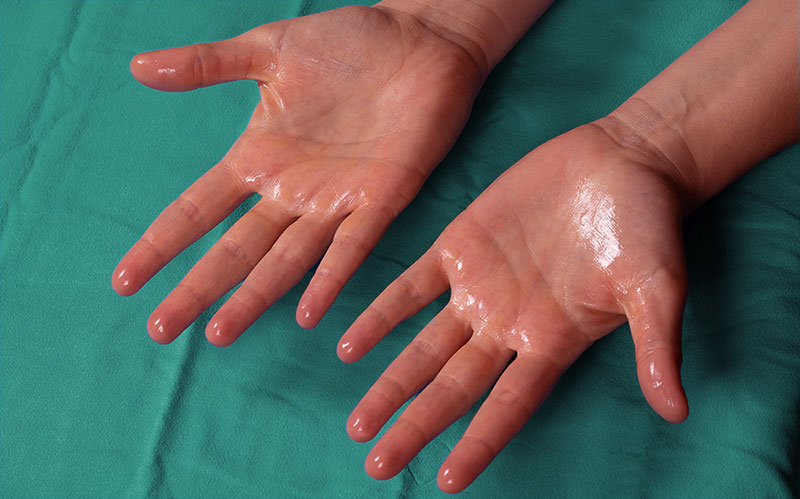Best Dermatology Approaches for Sweaty Hands Treatment: Tips and Techniques
Best Dermatology Approaches for Sweaty Hands Treatment: Tips and Techniques
Blog Article
Understanding the Origin Causes of Excessive Sweating and Its Impact on Every Day Life
Excessive sweating, additionally understood as hyperhidrosis, is a condition that affects a substantial section of the population, yet its underlying causes and effects on day-to-day operating continue to be rather enigmatic. While it is typically understood as a physical response to regulate body temperature, the triggers for too much sweating can differ commonly amongst people, incorporating not only physical variables however emotional and likewise emotional elements. Furthermore, the effect of this problem extends beyond simple discomfort, usually affecting social interactions and general lifestyle. By diving into the origin of hyperhidrosis and exploring its complex impacts, a deeper understanding of this prevalent concern can be gained, clarifying the intricacies that individuals grappling with too much sweating browse on a day-to-day basis.
Physiology of Sweat Glands
The law of sweat manufacturing, an important physiological process, is mainly managed by the activity of sweat glands dispersed across the human body. Sweat glands are classified right into 2 main types: eccrine and apocrine glands.
When the body temperature level increases, either due to exercise, heats, or emotional stress, the nerves activates the gland to create sweat. This sweat is composed mainly of water and electrolytes like sodium and chloride. The process of sweat manufacturing is necessary for keeping the body's inner temperature within a slim, optimal variety, highlighting the critical function gland play in human physiology.
Triggers for Excessive Sweating
In recognizing the source of excessive sweating, it is vital to determine the triggers that can result in this physical response. Extreme sweating, likewise referred to as hyperhidrosis, can be motivated by different factors, both environmental and physical. One common trigger is psychological stress and anxiety or anxiety, which can stimulate the body's sweat glands to produce more sweat than is necessary for cooling. Physical exertion, heats, and spicy foods are also recognized to cause too much sweating in people susceptible to this problem. Specific clinical problems like menopause, hyperthyroidism, or diabetic issues can contribute to too much sweating as well.
Furthermore, medicines such as some antidepressants, opioids, and particular supplements can also work as triggers for hyperhidrosis. Comprehending these triggers is essential in taking care of extreme sweating successfully - Exessive Sweating. By recognizing and addressing the specific triggers that motivate excessive sweating in a specific, health care suppliers can develop customized therapy strategies to minimize this problem and enhance the individual's quality of life
Medical Conditions Associated
Connected with too much sweating are numerous clinical conditions that can intensify this physical action. One usual problem is hyperhidrosis, a disorder characterized by unusually boosted sweating that goes beyond the body's thermoregulatory needs. This can manifest in focal areas like the hands, soles, underarms, or face, impacting an individual's lifestyle due to social humiliation and discomfort.
Additionally, endocrine problems such as hyperthyroidism, diabetes, and menopausal warm flashes can likewise lead to too much sweating. Hyperthyroidism triggers an hop over to here overflow of thyroid hormonal agents, speeding up metabolic process and activating sweating.
In addition, infections like tuberculosis, endocarditis, and hiv have actually been related to evening sweats, a typical symptom understood to interrupt rest and influence general well-being. my company These medical problems highlight the varied array of underlying elements that can add to extreme sweating, requiring comprehensive assessment and management by health care professionals.
Emotional and Emotional Factors

Influence On Social Communications
Excessive sweating can have profound effects on a person's capability to involve easily in social interactions. The visible signs of sweat discolorations or wet visit patches on clothes can result in shame and self-consciousness, creating people to withdraw from social situations. This withdrawal can impact relationships, limitation social activities, and hinder professional and individual growth.

Moreover, the anxiousness and self-worth concerns stemming from excessive sweating can influence interaction and interpersonal skills. Individuals might struggle to focus on conversations, take part in team activities, or reveal themselves with confidence. This can lead to feelings of isolation and loneliness, as social connections come to be testing to preserve.
Final Thought

While it is generally comprehended as a physiological response to manage body temperature, the triggers for extreme sweating can vary extensively amongst individuals, incorporating not only physical factors however emotional and also emotional elements. By diving right into the root causes of hyperhidrosis and exploring its multifaceted results, a deeper understanding of this prevalent problem can be gotten, dropping light on the intricacies that individuals grappling with extreme sweating navigate on a daily basis.
Physical effort, high temperatures, and spicy foods are likewise understood to set off excessive sweating in people prone to this problem. By determining and attending to the certain triggers that motivate excessive sweating in an individual, health care companies can establish customized treatment plans to minimize this condition and boost the individual's high quality of life.
Extreme sweating can have profound impacts on an individual's ability to involve comfortably in social communications.
Report this page